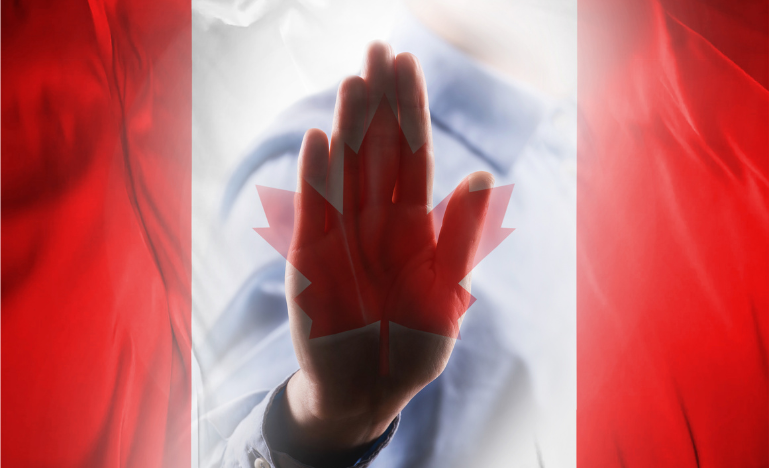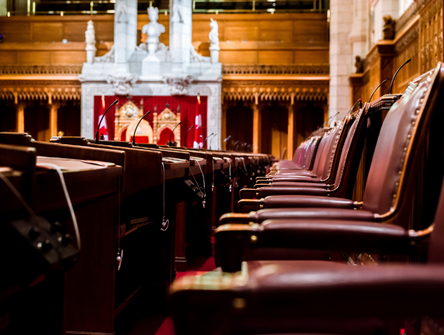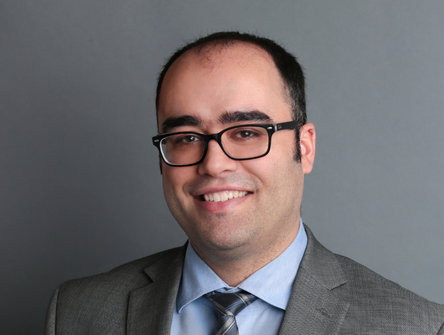‘An anti-refugee bill in all respects’
While Bill C-2 proclaims to improve and modernize Canada's asylum system, experts say it’s a ‘cruel law’ that will do the opposite, while diluting Charter-enshrined refugee protections

The federal government’s border security omnibus bill has been widely criticized, including by the Migrant Rights Network, which says it aims to create a mass deportation regime.
“It is a cruel law designed to dilute refugee protections that have been enshrined in the Charter,” says Aadil Mangalji, a partner and immigration lawyer at LM Law Group in Toronto.
“It is unravelling the refugee system as we know it, and ensuring that people don't get a free and fair hearing.”
Bill C-2, known as the Strong Borders Act, blocks anyone in Canada for more than a year from claiming refugee status, even if the situation in their home country changes and becomes dangerous after their arrival. The provision applies retroactively to June 2020.
Legal experts say the one-year deadline is completely arbitrary and fails to recognize the reality of people seeking refugee status in Canada.
“They only think of the traditional refugee from 1945 who came from war and knew immediately that they were at risk,” Mangalji says.
“But that's not how the refugee system works for most people.”
Traumatized claimants need time
At Lehal Law in Delta, B.C., Kamaljit Kaur Lehal’s practice focuses on gender persecution. She says most clients who file refugee claims are traumatized and struggle to share what they’ve been through.“For a number of people, it may take them well beyond the year before they're able to get to that place where they're able to say, I'm ready to make a refugee claim.”
Lehal recalls one client in particular, who has given permission to speak about her case, who was attacked by a group of men in her home country and violated in the most horrible way. Before coming to Lehal, her refugee claim was refused because she couldn’t talk about what had happened.
“It’s going to take me down a really dark hole, and I just can’t go there,” she told Lehal.
It took months for Lehal to gain her trust and convince her to see a female psychologist, who was able to diagnose her with post-traumatic stress disorder. Eventually, they were able to reopen her refugee claim, and she was successful.
“It was a process because you’re dealing with some of the most vulnerable people, who need that support and time to be able to divulge things I find really challenging to hear,” says Lehal.
The reality is that most people would avoid a refugee claim if they could, and choose an economic or other pathway to come to Canada to avoid having to retell the triggering circumstances of trauma and torture.
“I think people need to be reminded of that,” she says, noting the fear of persecution is a tough test to meet, with set criteria and evidence required to substantiate a claim.
“It's not a slam dunk by any means. So to expect people who have gone through something traumatic to be able to just come to the country and say, I'm going to make a refugee claim, it doesn't always unfold that way.”
Many of Mangalji’s clients are part of the LGBTQ2+ community, which he says will be particularly impacted by the proposed change.
That’s because in many cases people who come here as students, visitors, or workers, even if they were queer or had queer thoughts, never acted on it back home because they were never in a safe enough place to start their coming out.
“When they're in Canada, they start to realize who they are. And so we have trans claims, queer or gay claim, lesbian claims, that all come after being in safety for a certain period. But it can take years for people to feel safe to do that,” Mangalji says.
“The expectation of this law is that you just come and know who you are immediately, which is an absurdity. It’s not an on-off switch. It's a process that happens, often over years. But now, if you don't somehow figure out who you are in the first year, you suddenly get a much less fair immigration process.”
Lowering the standard of procedural fairness
Currently, refugee claims go before the Immigration and Refugee Board of Canada, an independent tribunal that doesn’t report to the minister. Members are experts in refugee law and receive training to be trauma-informed adjudicators and handle highly sensitive cases. They also have specific subject guidelines to follow, including for matters involving gender persecution.
During IRB hearings, claimants can make their case about the risks they face at home and lawyers have full hearing rights, much like in court. Mangalji says lawyers have access to all the evidence and can also put it forward, conduct cross-examinations and provide closing submissions outlining relevant law.
If Bill C-2 comes into force, anyone who doesn’t make a refugee claim within the first year will no longer have access to this and must instead undergo a pre-removal risk assessment (PRRA).
The PRRA system is not an independent tribunal. Members are employees of Immigration and Refugees and Citizenship Canada, which means the minister is their boss.
A PRRA is not a hearing, and lawyers don’t really have any role. While they’re allowed to be present during the interview and ask follow-up questions for clarity, they don’t make any submissions on behalf of their client. The process is also unrecorded, so nobody knows what was said in the hearing. The record is entirely based on officer notes.
Traditionally, if you had a hearing before the IRB and were ordered to be removed from the country, the PRRA was one last chance for a claimant to make their case. It was designed for people who have already gone through the refugee hearing process.
“I don't think Canadians — or the Liberal government, for that matter — understand the fundamental difference between the PRRA and the Immigration and Refugee Board tribunal. Essentially, they're forcing these people into what I do not consider a Charter-compliant process,” Mangalji says.
“In terms of basic procedural fairness, it’s at a much lower standard.”
The Supreme Court of Canada’s 1985 decision in Singh established that refugee claimants have a constitutional right to an oral hearing before an independent tribunal. Further, the Court was clear that the legal guarantees of the Charter of Rights and Freedoms apply to “everyone” physically present in Canada, including foreign asylum seekers.
“We’re seeing this legislation undoing decades' worth of established law,” Lehal says.
Problems with the PRRA process don’t end there.
Mangalji has just judicially reviewed his third PRRA in which officers got the country of removal wrong — “literally the most basic fact of the case.”
He says he can find an error in most PRRA decisions and has yet to see one that’s clean on the law. That’s because the officers involved in the process aren’t experts in refugee law and make mistakes in every situation.
“I would put, at best, these are new hires looking at this,” Mangalji says.
The result? “Almost every PRRA can be reviewed. I can’t say that about the board.”
Adding to the backlog
At a time when the Federal Court is drowning in a backlog of judicial reviews of immigration applications, he told a panel at the CBA’s immigration law conference in Victoria that the proposed changes in this legislation will add to that considerably.
Lehal finds the suggestion that a PRRA is an adequate substitute for an IRB hearing troubling.
“There’s a one or two per cent chance of your PRRA being successful. In my 35 years of doing this, I’ve yet to have a PRRA succeed,” she says.
“I just don’t see how that system will be able to handle these highly complex cases with traumatized individuals. It’s not set up for that.”
Provisions in Bill C-2 would make it virtually impossible for most people coming to Canada through the U.S. to have their refugee claim heard by the IRB. They remove a U.S. border exception which allowed migrants who crossed from the U.S. between official ports to apply for refugee status after 14 days.
The proposed legislation also gives cabinet the power to cancel existing permanent resident visas, as well as study and work permits, temporary resident visas, and other immigration status documents if the Governor in Council thinks that “it is in the public interest to do so.”
While one of the intended targets of this is people buying job offers, which is something ethical lawyers disagree with, Deanna L. Okun-Nachoff of McCrea Immigration Law in Vancouver says that needs to be approached in a strategic and calibrated way.
“We don't think that they should, just across the board, be able to cancel entire categories, because there's nothing that stops them from canceling the best categories that should be in the legislation itself, which categories they will have that for rather than targeting actual problematic categories,” she told host Alison Crawford on the latest episode of Modern Law: Verdicts and Voices.
Zero consultation
The fact that all of this has been rolled into an omnibus bill is problematic, as are the government’s efforts to pass it quickly. It comes amid Canada’s plans to reduce its refugee intake targets. The country’s temporary population, including international students, foreign workers and refugees, will be reduced by 445,901 in 2025 and 445,662 in 2026.
“Speed does not make for good law,” Okun-Nachoff says, noting that while things can be fast, cheap, or good, they can’t be all three simultaneously. Prioritizing one means sacrificing on another.
“I think that that's what we've seen so profoundly in the immigration sector: when they go for cheap and fast, they lose quality. And that's what has caused the crisis in the immigration sector, in my view. I think we're trying to lower numbers, but also do things fast, and what we will stand to do is not achieve protection of the best and brightest.”
If this legislation passes, Canada will stop being a good destination country, and those who are deeply in need of protection are going to be deported back to places where they might die, despite the fact they’re exactly who our international law commitments were meant to protect.
“It sounds quite extremist, but speaking as a very ethical immigration lawyer, that's what I think are going to be the consequences of this legislation,” she says.
For Lehal, who chairs the CBA’s immigration law section, the insult to injury is that the bill was tabled just days after the section sent Immigration Minister Lena Metlege Diab a report with 100 recommendations to modernize the Immigration and Refugee Protection Act, which is now almost 25 years old.
It called for the creation of a transparent immigration system that is just, fair, and inclusive to address the fragmented, opaque manner in which refugee claims are currently handled.
“This legislation is quite at odds with what we would hope to see,” she says.
“The bill's stated purpose is to improve and modernize the asylum system, but we’re seeing it as doing the opposite. It’s going to make matters more complex and even more opaque.”
Mangalji doesn’t know anyone in the CBA or the Canadian Association of Refugee Lawyers who was consulted on the legislation.
“We didn’t see it coming,” he says.
“It is terrifying to me that a new minister essentially chose not to consult with anybody before putting forward probably the most expansive destruction of the refugee board we've seen.”
For him, this is a “(Prime Minister Mark) Carney kissing the hand” bill. He’s disappointed to see the Liberals fall in line with American rhetoric and treat refugees as if they’re a safety threat to Canada, when just a short while ago, we were talking about sunnier ways and the contributions refugees make to this country.
“This is the most vicious thing that's been done to refugees since the Safe Third Country Act. And maybe even more significant than that,” Mangalji says.
“I think the Liberals need to take a look in the mirror to determine if this is the government that they want to be, because this is an anti-refugee bill in all respects.”


